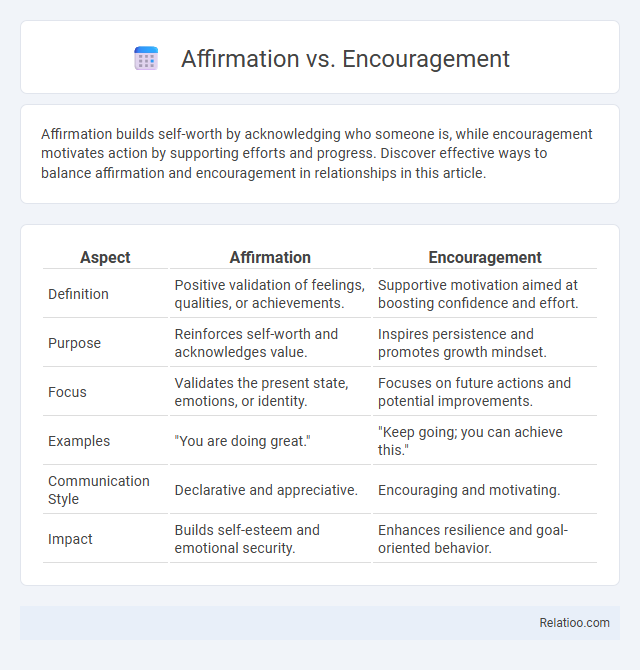Affirmation builds self-worth by acknowledging who someone is, while encouragement motivates action by supporting efforts and progress. Discover effective ways to balance affirmation and encouragement in relationships in this article.
Table of Comparison
| Aspect | Affirmation | Encouragement |
|---|---|---|
| Definition | Positive validation of feelings, qualities, or achievements. | Supportive motivation aimed at boosting confidence and effort. |
| Purpose | Reinforces self-worth and acknowledges value. | Inspires persistence and promotes growth mindset. |
| Focus | Validates the present state, emotions, or identity. | Focuses on future actions and potential improvements. |
| Examples | "You are doing great." | "Keep going; you can achieve this." |
| Communication Style | Declarative and appreciative. | Encouraging and motivating. |
| Impact | Builds self-esteem and emotional security. | Enhances resilience and goal-oriented behavior. |
Understanding Affirmation and Encouragement
Understanding affirmation involves recognizing it as a powerful statement that validates Your feelings, strengths, or values, reinforcing self-worth and confidence. Encouragement, on the other hand, focuses on motivating action and resilience by providing support and positive reinforcement during challenges. Both affirmation and encouragement play crucial roles in personal growth, with affirmation nurturing internal belief and encouragement inspiring external effort.
Definition of Affirmation
Affirmation is a positive statement that reinforces self-worth and confidence by acknowledging personal strengths or values, often rooted in consistent internal validation. Encouragement involves offering support or motivation to help someone overcome challenges or pursue goals, while reassurance provides comfort and reduces doubts during uncertainty. Understanding the distinction helps you apply the right approach to boost self-esteem and resilience effectively.
Definition of Encouragement
Encouragement is the act of giving someone support, confidence, or hope to pursue their goals or face challenges. Affirmation involves confirming or validating a person's feelings or qualities, while praise is expressing approval for someone's achievements or behavior. You can boost motivation effectively by understanding that encouragement fosters resilience and proactive effort through supportive communication.
Key Differences Between Affirmation and Encouragement
Affirmation involves confirming and validating a person's inherent worth or qualities, reinforcing self-belief through positive statements. Encouragement focuses on motivating and inspiring action or effort, often aimed at overcoming obstacles or pursuing goals. The key difference lies in affirmation affirming identity and value, while encouragement drives behavior and perseverance.
Psychological Impact of Affirmation
Affirmation strengthens Your self-worth by reinforcing positive beliefs and fostering a resilient mindset, which boosts long-term psychological well-being. Encouragement provides motivational support in specific situations but may not deeply alter core self-perception as affirmations do. The psychological impact of affirmation lies in its ability to rewire negative thought patterns, promoting sustained confidence and emotional stability.
Psychological Benefits of Encouragement
Encouragement promotes psychological resilience by fostering self-confidence and motivation, helping individuals overcome challenges and pursue goals with a positive mindset. Unlike affirmation, which reinforces existing beliefs or qualities, encouragement actively supports growth and persistence, reducing anxiety and enhancing emotional well-being. This proactive support strengthens neural pathways related to optimism and adaptive coping strategies, making encouragement a critical tool in mental health and personal development.
Use Cases: When to Affirm and When to Encourage
Affirmation is best used to validate someone's qualities or achievements, reinforcing their self-worth and confidence in specific areas such as skills or values. Encouragement is ideal when motivating someone facing challenges or uncertainty, promoting persistence and resilience during difficult tasks or new experiences. Use affirmation after accomplishments to boost self-esteem, and encouragement when individuals need support to overcome obstacles or take risks.
Affirmation and Encouragement in Personal Growth
Affirmation strengthens your self-belief by reinforcing positive qualities and values, fostering internal confidence essential for personal growth. Encouragement supports motivation and resilience by offering external validation and uplifting feedback during challenges. Both affirmation and encouragement play complementary roles in nurturing self-improvement, with affirmation building inner strength and encouragement providing the external push to pursue goals.
Practical Examples: Affirmation vs Encouragement
Affirmation involves recognizing and validating someone's inherent worth or past achievements, such as saying, "You handled that project with great skill." Encouragement focuses on motivating future effort or growth, for example, "Keep practicing, and you'll master this skill soon." Practical examples illustrate that affirmations build confidence by reinforcing identity, while encouragement drives perseverance through support for ongoing challenges.
Choosing the Right Approach for Positive Communication
Choosing the right approach for positive communication involves understanding the distinct roles of affirmation, encouragement, and validation. Affirmation strengthens self-worth by acknowledging inherent qualities, encouragement boosts motivation by highlighting effort and progress, and validation helps individuals feel heard and understood by recognizing their emotions and experiences. Tailoring these strategies to the situation ensures effective support and fosters a positive, growth-oriented dialogue.

Infographic: Affirmation vs Encouragement
 relatioo.com
relatioo.com